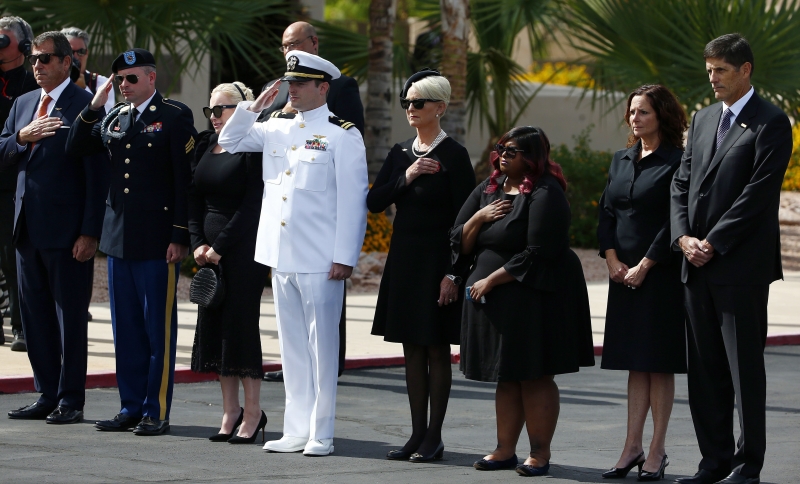McCain and a requiem for the American century
The services across the nation marking the passing of Sen. John McCain are also a requiem for the American century. He lived through the zenith of postwar American power; believed, despite setbacks, in America’s unique capacity to forge a more open and democratic world; and held America’s word as pledge in the cause of liberty.
These ideas seem quaint today, tired relics glibly discarded. Perhaps that is why McCain’s death has caused a moment of national reflection. The world has changed. China has risen. American power is no longer determinant. Flux is in the nature of things. But did the United States of President Donald Trump really need to take a sledgehammer to its values, its responsibilities and the anchors of its prosperity? It is fitting that Trump has been absent from the ceremonies.
The two men loathed each other more than death could overcome. Trump’s aim is the dismantlement of the world that gave McCain’s life purpose: the Atlantic Alliance, a rules-based international order, resolve towards Vladimir Putin’s Russia. Honor, decency and duty were ideas around which McCain built his life of service.
They are concepts that have no meaning for Trump, the bone-spur rich kid from Queens. The president of the United States is persona non grata at services that speak of bipartisanship, of American ideals, of self-sacrifice rather than self-interest, of an American global commitment that goes beyond “Pay up now!” Trump stands outside the American tradition. In years past, I would watch McCain at the Munich Security Conference.
The experience was never less than bracing. Beside him, others seemed mealymouthed. He had known the extremes of human experience, lived in full. His voice contained that fullness. He was a man of conviction. He preferred to be wrong than to bend. Torture over more than five years of captivity had imbued him with a humanity that transcended politics, even if did not dim his cantankerous bellicosity.
He had bombed Vietnam in a losing war of confused aims and official obfuscation. He emerged unbowed in his belief in “the world’s greatest republic, a nation of ideals, not blood and soil,” as he put it in his farewell letter. McCain was obstinate, sometimes to the point of obtuseness.
America’s many failures were as nothing beside American achievement. Stubbornness defined him in an age of fingerto-the-wind opportunism. As a spineless Republican Party folded into the Trump Party, McCain came to stand almost alone as a politician of principle. His party moved. He did not. Nowhere was McCain greater than on the subject of torture, a practice for which Trump’s sympathies are evident, and not only in his appointment of Gina Haspel — a woman deeply involved in the Bush administration’s “enhanced interrogation” regime — to head the CIA.
Here is McCain in 2014, responding to the Senate Intelligence Committee Report on CIA methods deployed in the aftermath of the 9/11 attacks: “I know from personal experience that the abuse of prisoners will produce more bad than good intelligence. I know that victims of torture will offer intentionally misleading information if they think their captors will believe it. I know they will say whatever they think their torturers want them to say if they believe it will stop their suffering. Most of all, I know the use of torture compromises that which most distinguishes us from our enemies, our belief that all people, even captured enemies, possess basic human rights, which are protected by international conventions the US not only joined, but for the most part authored.” An important voice for “basic human rights” is gone.
Trump does not know what human rights are. That McCain voice could be erratic or impetuous, but it was never petty. I disagreed with McCain about many things: his incorrigible itch to bomb Iran, his bizarre back-and-forth on Barack Obama’s Affordable Care Act. He ran a comically disastrous campaign as the Republican candidate for the presidency in 2008. His choice of Sarah Palin as his running mate elevated the jingoistic idiocy that has become a Republican hallmark.
It was a terrible mistake. The Straight Talk Express, as his bus was named in both his presidential campaigns, has degenerated a decade later into Trump’s “tell-it-like-it-is” Fox News spectacular. I wish I could believe the outpouring of sympathy for McCain marks the moment when principle and bipartisanship will rise above lies and fracture in American politics. But I don’t, at least not in the near term. The nationalist, nativist, xenophobic tide has not yet run its course.
In many respects, McCain was a dinosaur. That’s because his words from 2017 are out of fashion: “To refuse the obligations of international leadership and our duty to remain ‘the last best hope of earth’ for the sake of some half-baked, spurious nationalism cooked up by people who would rather find scapegoats than solve problems is as unpatriotic as an attachment to any other tired dogma of the past that Americans consigned to the ash heap of history.” They will resonate nonetheless, beyond “America First” and all that ash-heap-bound Trump drivel.
Related Posts

